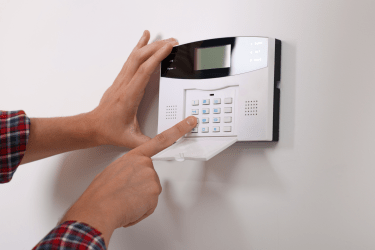Comprehensive Financial Planning Strategies for Home Security

Comprehensive Financial Planning Strategies for Home Security
In today’s world, the concept of home security extends far beyond just locks and alarms. A truly secure home is one where safety measures are intertwined with a robust financial plan. This approach ensures not only the physical protection of your household but also its financial stability. As our homes become smarter and more connected, the need to align home finances with security measures becomes crucial. By integrating financial planning strategies with cutting-edge home security systems, you can create a fortress that safeguards both your loved ones and your assets. Understanding how to navigate this intersection of finance and security will set you on a path to peace of mind, knowing that every aspect of your home is protected.
The Intersection of Financial Planning and Home Security
Why Financial Planning Matters
Financial planning is the backbone of a secure life. Without a secure financial plan, even the most advanced home security systems fall short. It’s essential to budget for both immediate and long-term security expenses. This involves understanding the costs associated with installing, maintaining, and upgrading your security systems. A well-thought-out financial plan should account for periodic updates and potential emergencies, ensuring that your home remains protected at all times.
Financial Planning for Young Professionals

Financial Planning for Young Professionals
Financial planning is a crucial aspect of ensuring a stable and secure future, especially for young professionals who are at the early stages of their careers. By understanding the fundamentals of financial planning and analysis, individuals can lay a strong foundation for long-term financial success. This article delves into the key components of financial planning, the financial planning process, and the importance of having a well-defined financial plan.
Understanding Financial Planning and Analysis
Financial planning involves the assessment of an individual’s current financial situation, setting financial goals, and creating a roadmap to achieve those goals. Financial analysis plays a vital role in this process by examining income, expenses, investments, and other financial aspects to make informed decisions. For young professionals, financial planning and analysis serve as guiding principles to manage income effectively, save for the future, and build wealth over time.
The Financial Planning Process
The financial planning process typically consists of several key steps that young professionals should consider:
- Setting Financial Goals: Establish clear and achievable short-term and long-term financial goals, such as saving for a home, starting a business, or retirement planning.
- Assessing Financial Situation: Evaluate current income, expenses, assets, liabilities, and investment portfolio to understand your financial position.
10 Smart Ways to Manage Your Home Finances Efficiently

10 Smart Ways to Manage Your Home Finances Efficiently
Managing your home finances efficiently is more crucial than ever in today’s economic climate. With the rising cost of living, unexpected financial challenges, and the constant evolution of financial products and tools, having a robust plan to oversee your finances can make a significant difference in achieving financial stability and peace of mind. Whether you’re looking to save for a rainy day, reduce debt, or simply gain better control over your household budget, implementing smart financial strategies is crucial. In this article, we will explore
ten effective methods to manage your home finances efficiently, from leveraging advanced tools like personal finance management software to practical money-saving tips anyone can follow. Moreover, we’ll discuss budget-friendly security solutions that not only protect your savings but also ensure the safety of your home without breaking the bank. So let’s dive in and discover how you can take command of your financial future with ease and efficiency.
Create a Realistic Budget
The cornerstone of successful home finance management is a realistic budget. Start by tracking all your income and expenses to understand where your money is going. Categorize your expenditures into essential and non-essential items. Essential items include things like rent, mortgage payments, utilities, groceries, and transportation.
The Role of Credit Monitoring in Home Finance Security

The Role of Credit Monitoring in Home Finance Security
In today’s fast-paced financial landscape, safeguarding your home finances is more crucial than ever. With the rise of digital transactions and increasing instances of identity theft, ensuring the security of your financial information can make a significant difference in maintaining peace of mind. One of the most effective strategies to achieve financial security is through consistent credit monitoring. Credit monitoring serves as an essential tool in detecting fraudulent activities, protecting your personal information, and maintaining a healthy credit score. It allows you to stay informed about any changes in your credit report, enabling you to take swift action when necessary. By incorporating credit monitoring into your financial routine, you not only safeguard your home finances but also enhance your overall financial well-being. And speaking of financial well-being, don’t forget the importance of emergency funds; they provide a safety net that cushions the impact of unexpected expenses, ensuring that your home finance management remains unscathed.
Understanding Credit Monitoring
What is Credit Monitoring?
Credit monitoring is a service that tracks your credit reports from major credit bureaus such as Equifax, Experian, and TransUnion. The primary purpose of this service is to alert you to any significant changes or suspicious activities on your credit report.
Secure Financial Plan for Your Home Security

Secure Financial Plan for Your Home Security
In an era where financial stability and home security are paramount, it’s essential to formulate a secure financial plan that ensures both. The intersection of financial planning and home security often goes overlooked, but the reality is that they are deeply intertwined. By strategically planning your finances, you can safeguard your home, protect your assets, and ensure peace of mind.
The Importance of Financial Planning for Home Security
Financial planning is not just about managing money; it’s about securing your future and ensuring that your home remains a safe haven. A well-thought-out financial plan helps you allocate resources effectively, providing for immediate needs while saving for long-term goals. Home security measures, whether physical or digital, require investments that should be carefully planned within your budget.
Understanding the Costs Involved
- Initial Setup Costs: The initial costs of setting up a home security system can vary widely depending on the type of system you choose. Basic systems may cost a few hundred dollars, while more advanced systems with smart technology can run into thousands.
- Maintenance and Upgrades: Over time, security systems may need upgrades or maintenance to stay effective. Factoring these into your financial plan ensures that your home security remains robust.
